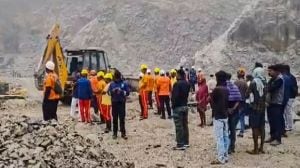Pepsi146;s new fight is over an algae
Veteran scientist M S Swaminathan has a serious grouse against Pepsi. It8217;s something that has got marine biologists worrying. The soft ...

Veteran scientist M S Swaminathan has a serious grouse against Pepsi. It8217;s something that has got marine biologists worrying. The soft drink manufacturer has introduced an alien marine algae in a biodiversity hotspot 8212; Rameshwaram in Bay of Bengal.
This is next to the Gulf of Mannar National Park. And the scientists see this is a very serious threat to the ecosystem of the area.
Pepsi Foods Limited has gone for large-scale cultivation of a seaweed, a unique red algae called euchema cottonii, which is the best source of carrageenan, a tasteless gelatin like pure vegetarian substance that8217;s added to desserts as a stabilizer.
Carrageenan is added to almost all the mocha and other coffees and in upmarket beverages and mocktails. Carrageenan sells for over a lakh of rupees a ton and at present India imports most of it.
What could be wrong with growing innocuous looking seaweeds hung on strings of nylon rope which, without the addition of any pesticides or fertilizers and under the blazing sun, turn into a million-dollar, value-added food additive.
Many times in the past such species have inflicted widespread damage on natural ecosystems and the scientists fear this time it would be no different. Swaminathan told The Indian Express: 8216;8216;It can turn into a serious problem 8212; the algal fields should be destroyed and a rigorous monitoring system put in place to ensure that further damage does not take place.8217;8217; With an investment of over Rs 40,000 per hectare, Pepsi acknowledges that in the first phase, test plots at select locations with the permission of the state government have come up across 10 hectares this year. The worldwide turnover of carrageen is estimated to be about 300 million. Philippines accounts for more than 70 of the world8217;s production.
According to Pepsi, domestic manufacture of carrageenan will result in import substitution and save valuable foreign exchange. Since the cultivation is labour intensive, it can provide significant employment opportunities for local fishermen.
The company says it bought the technology from the Central Salt and Marine Chemicals Research Institute in Bhavnagar, which apparently imported this algae from Philippines many years ago. Abhiram Seth, Executive Director Exports, Pepsi Foods, says 8216;8216;one twig was imported about 12 years ago, and since then from that one plant which has multiplied manifold, the algae has been completely acclimatized to Indian conditons.8217;8217; Scientist fear that this alien species could damage the coral reefs in the Gulf of Mannar.
8216;8216;This is not a healthy practice and it may bring havoc,8217;8217; warns Dr. V. Selvam, a marine biologist and project director at the Mandapam field station of the M.S. Swaminathan Research Foundation, Chennai.
Naturally, seaweeds propagate by two methods 8212; spore formation and vegetative propagation. Selvam says vegetative propagation is not very dangerous since it may not allow the seaweed to proliferate on a large scale. But if proliferation through spores happened, you could expect the worse.
Seth counters by saying 8216;8216;the release of the algae has been undertaken after more than 10 years of research and they have been found to be compatible with the Indian marine ecology.8217;8217; Swaminathan is not buying this explanation.
He points out that according to an assessment made by the Convention on Biological Diversity, after habitat loss, the second most important factor for the loss of native species is the introduction of alien species.
- 01
- 02
- 03
- 04
- 05






























